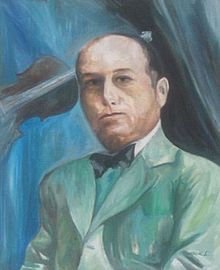Nándor Zsolt

Nándor Zsolt (May 12, 1887 Esztergom, Austria-Hungary - Jun 24, 1936 Budapest, Hungary) was a Hungarian violinist, conductor, composer and the professor of violin at the Franz Liszt Academy of Music.
He was born in a professional musician family, his father was a conductor and music teacher. After graduating in Esztergom, he entered the Liszt Ferenc Academy of Music in Budapest, taking violin studies with Jenő Hubay and composition with Hans von Koessler.[1]
After finishing his studies in Budapest, he continued his musical career in England, where he became the concertmaster of the Queen's Hall Orchestra in London in 1908 at the age of 21. Nándor Zsolt made his soloist debut in London at The Proms in 1909, playing the Violin concert of Tchaikovsky under the baton of Henry Wood,[2] later his compositions were published by the English music publisher, Augener & Co. Besides it, he gave concerts in Paris, and appeared as a conductor in Wienna in 1914 as well. After the break out of the World War I in 1914, he had to have spent five years in an internment camp on the Isle of Man, the reason of it was his Austria-Hungarian citizenship.
Coming back to Hungary in 1919, he became the professor of violin at the Franz Liszt Academy of Music,[3] among his successful students were Sándor Végh, Tibor Ney.[4] Nándor Zsolt founded orchestras in Hungary, his virtuoso character compositions were performed in and outside Hungary.[5][6]
Nándor Zsolt died unexpectedly in Budapest at the age of 49.
Compositions (selected)
- Symphony
- Violin concert, d-moll (premiered in 1906)
- F-dur Romanze for violin and piano op. 1 (1902)
- Toccata
- Air
- Valse
- Berceuse
- Elegy
- In chains
- Satyr and Dryade
- Sonata for vilolin
- Es ragt ins Meer, song for the verse of Heine
- Der erste Verlust, song for the verse of Goethe
- Der schwere Abend, song for the verse of Lenau
References
- ^ Szabolcsi Bence - Tóth Aladár: Zenei lexikon, Zeneműkiadó Vállalat, 1965. III. p. 732.
- ^ BBC Proms arhive
- ^ Szabolcsi Bence - Tóth Aladár: Zenei lexikon, Zeneműkiadó Vállalat, 1965. III. p. 732.
- ^ Franz Liszt Academy of Music - NOTABLE ALUMNI, "Sándor Végh"
- ^ DAVID HOCHSTEIN'S RECITAL; Excellent Violin Playing by a Young American in Aeolian Hall, November 20, 1915 The New York Times
- ^ Mr. Moiselwitsch's Recital. February 23, 1921. The New York Times
Sources
- Szabolcsi Bence - Tóth Aladár: Zenei lexikon, Zeneműkiadó Vállalat, 1965. III. p. 732.
